Border restrictions on non-essential travel between Canada and the United States have been prolonged for another month, Canada’s Public Safety Minister Bill Blair said in an announcement on Twitter Oct. 19.
Blair said the decision was “based on the best public health advice available to keep Canadians safe.” The move delays non-essential travel from the United Sates until November 21, unless the restrictions are again extended.






